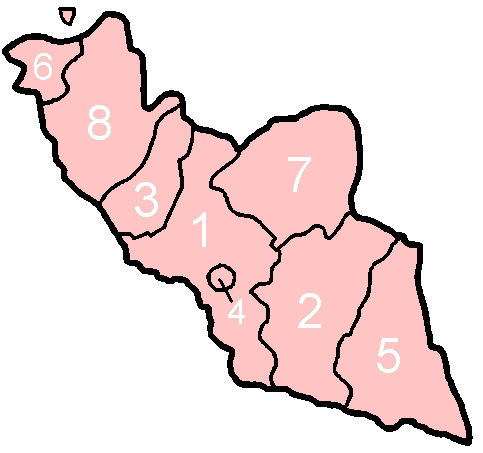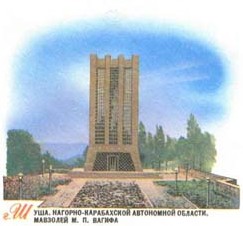|
Yuxarı Salahlı
Yuxarı Salahlı (; also, Upper Salahly) is a village and municipality in the Qazakh District of Azerbaijan. It has a population of 3,406. Notable natives * Samad Vurgun — prominent Azerbaijani poet, People's Poet of Azerbaijan SSR (1943). * Ibrahim bey Usubov — Azerbaijani Major General in Imperial Russian Army and Azerbaijan Democratic Republic. * Molla Panah Vagif Molla Panah (), better known by his pen-name Vagif (), was an 18th-century Azerbaijanis, Azerbaijani poet, statesman and diplomat. He is regarded as the founder of the realism genre and the modern school in Azerbaijani literature, Azerbaijani poe ... — 18th century poet and statesman References * Populated places in Qazax District {{Qazakh-geo-stub ... [...More Info...] [...Related Items...] OR: [Wikipedia] [Google] [Baidu] |
Administrative Divisions Of Azerbaijan
Azerbaijan is administratively divided into 67 districts () and 11 cities () that are subordinate to the Republic. Out of these districts and cities, 7 districts and 1 city are located within the Nakhchivan Autonomous Republic. The districts are further divided into Municipalities of Azerbaijan, municipalities (). Additionally, the districts of Azerbaijan are grouped into 14 Economic regions of Azerbaijan, Economic Regions (). On 7 July 2021, President of Azerbaijan Ilham Aliyev signed a decree "On the new division of economic regions in the Republic of Azerbaijan". Administrative divisions Contiguous Azerbaijan The list below represents the districts of contiguous Azerbaijan. For those of the Nakhchivan exclave, see further below. Nakhchivan Autonomous Republic The seven districts and one municipality of the Nakhchivan Autonomous Republic are listed below. Economic regions Nagorno-Karabakh The territory of former Nagorno-Karabakh Autonomous Oblast presently ... [...More Info...] [...Related Items...] OR: [Wikipedia] [Google] [Baidu] |
Qazakh District
Qazax District (; ) is one of the 66 districts of Azerbaijan. Located in the northwest of the country, it belongs to the Gazakh-Tovuz Economic Region. The district borders the district of Aghstafa, and the Tavush Province of Armenia. Its capital and largest city is Gazakh. As of 2020, the district had a population of 98,400. It has two exclaves inside Armenia, which include the villages of Yukhari Askipara, Barkhudarly, Sofulu. Both of the exclaves and parts of mainland Qazax District (the villages of Baghanis Ayrum, Ashaghi Eskipara, Gyzylhajily, and Kheyrimli) were captured by Armenian forces during the First Nagorno-Karabakh war. History The region was conquered by a succession of neighboring powers or invaders, including Armenians, Sassanid Persians, the Byzantine Empire, the Arabs, the Seljuq Turks, the Georgians, the Mongols, the Timurids, the Qara Qoyunlu and Aq Qoyunlu Turkoman tribes, and finally Safavid Iran. It was also ruled by Ottoman Empire between 15 ... [...More Info...] [...Related Items...] OR: [Wikipedia] [Google] [Baidu] |
Azerbaijan Time
Azerbaijan Time () is the standard time zone in Azerbaijan, four hours ahead of UTC ( UTC+04:00). The daylight saving time adjustment, Azerbaijan Summer Time (), was one hour ahead at UTC+05:00; it was introduced in 1997 and discontinued in March 2016. Azerbaijan Time is the same as Samara Time (Russia), United Arab Emirates Standard Time, Georgia Time, Armenia Time and Seychelles Time. History Azerbaijan, formerly the Azerbaijan Soviet Socialist Republic (Azerbaijan SSR), adhered to timekeeping regulations instituted by the Soviet Union The Union of Soviet Socialist Republics. (USSR), commonly known as the Soviet Union, was a List of former transcontinental countries#Since 1700, transcontinental country that spanned much of Eurasia from 1922 until Dissolution of the Soviet .... In 1930, the Council of People’s Commissars of the USSR implemented " Decree Time," which mandated a one-hour advancement of standard time across the entire Soviet territory. This mov ... [...More Info...] [...Related Items...] OR: [Wikipedia] [Google] [Baidu] |
Qazax District
Qazax District (; ) is one of the 66 districts of Azerbaijan. Located in the northwest of the country, it belongs to the Gazakh-Tovuz Economic Region. The district borders the district of Aghstafa, and the Tavush Province of Armenia. Its capital and largest city is Gazakh. As of 2020, the district had a population of 98,400. It has two exclaves inside Armenia, which include the villages of Yukhari Askipara, Barkhudarly, Sofulu. Both of the exclaves and parts of mainland Qazax District (the villages of Baghanis Ayrum, Ashaghi Eskipara, Gyzylhajily, and Kheyrimli) were captured by Armenian forces during the First Nagorno-Karabakh war. History The region was conquered by a succession of neighboring powers or invaders, including Armenians, Sassanid Persians, the Byzantine Empire, the Arabs, the Seljuq Turks, the Georgians, the Mongols, the Timurids, the Qara Qoyunlu and Aq Qoyunlu Turkoman tribes, and finally Safavid Iran. It was also ruled by Ottoman Empire between 1578 a ... [...More Info...] [...Related Items...] OR: [Wikipedia] [Google] [Baidu] |
Azerbaijan
Azerbaijan, officially the Republic of Azerbaijan, is a Boundaries between the continents, transcontinental and landlocked country at the boundary of West Asia and Eastern Europe. It is a part of the South Caucasus region and is bounded by the Caspian Sea to the east, Russia's republic of Dagestan to the north, Georgia (country), Georgia to the northwest, Armenia and Turkey to the west, and Iran to the south. Baku is the capital and largest city. The territory of what is now Azerbaijan was ruled first by Caucasian Albania and later by various Persian empires. Until the 19th century, it remained part of Qajar Iran, but the Russo-Persian wars of Russo-Persian War (1804–1813), 1804–1813 and Russo-Persian War (1826–1828), 1826–1828 forced the Qajar Empire to cede its Caucasian territories to the Russian Empire; the treaties of Treaty of Gulistan, Gulistan in 1813 and Treaty of Turkmenchay, Turkmenchay in 1828 defined the border between Russia and Iran. The region north o ... [...More Info...] [...Related Items...] OR: [Wikipedia] [Google] [Baidu] |
Samad Vurgun
Samad Vurgun ( ; born Samad Yusif oghlu Vekilov; March 21, 1906 – May 27, 1956) was an Azerbaijani and Soviet poet, dramatist, public figure, first People's Artist of the Azerbaijan SSR (1943), academician of Azerbaijan National Academy of Sciences (1945), laureate of two Stalin Prizes of second degree (1941, 1942), and member of the Communist Party of the Soviet Union from 1940. The Azerbaijan State Academic Russian Drama Theatre and streets in Baku and Moscow, and formerly the city of Hovk in Armenia, are named after him. Samad Vurgun is the first poet in the literature history of Azerbaijan who was given the title “The Poet of Public”. Biography Samad Vurgun was born on March 21, 1906, in Salahly village of Kazakh Uyezd, present day Qazax District of Azerbaijan Republic. Samad's mother died when he was six years old, and he was in the charge of his father and Ayshe khanim, his maternal grandmother. After graduating from school, his family moved to Qazax and Samad ent ... [...More Info...] [...Related Items...] OR: [Wikipedia] [Google] [Baidu] |
Great Soviet Encyclopedia
The ''Great Soviet Encyclopedia'' (GSE; , ''BSE'') is one of the largest Russian-language encyclopedias, published in the Soviet Union from 1926 to 1990. After 2002, the encyclopedia's data was partially included into the later ''Great Russian Encyclopedia'' in an updated and revised form. The GSE claimed to be "the first Marxist–Leninist general-purpose encyclopedia". Origins The idea of the ''Great Soviet Encyclopedia'' emerged in 1923 on the initiative of Otto Schmidt, a member of the Russian Academy of Sciences. In early 1924 Schmidt worked with a group which included Mikhail Pokrovsky, (rector of the Institute of Red Professors), Nikolai Meshcheryakov (Former head of the General Directorate for the Protection of State Secrets in the Press, Glavit, the State Administration of Publishing Affairs), Valery Bryusov (poet), Veniamin Kagan (mathematician) and Konstantin Kuzminsky to draw up a proposal which was agreed to in April 1924. Also involved was Anatoly Lunacharsky, People' ... [...More Info...] [...Related Items...] OR: [Wikipedia] [Google] [Baidu] |
Ibrahim Bey Usubov
Ibrahim bey Musa Agha oghlu Usubov (; ; March 6, 1872 – June 16, 1920) was an Azerbaijani Major General in Russian Imperial Army and Azerbaijan Democratic Republic. Early life Ibrahim bey Usubov was born to the family of military officer, Musa Agha Usubov on March 6, 1872 in Yukhary-Salakhly village of Qazakh uyezd. Receiving military upbringing and discipline from his father, Ibrahim bey Usubov went to famous Constantine Artillery School. After graduation, Usubov received a rank of podporuchik and was assigned to Tambov 122nd Infantry Regiment. Family Musa Agha who was an officer in Russian Imperial Army and received military rank of praporshchik July 2, 1839, was Deputy Chief of Muslim honour detachment and Commander in Chief of Separate Caucasian Corps prince Vorontsov. For his bravery in the battles against mountain peoples in village Dargo and Gerzel on January 28, 1845 he was awarded with Order of Saint Stanislaus of 3rd degree. On July 9, 1848 Musa Agha Usubov bec ... [...More Info...] [...Related Items...] OR: [Wikipedia] [Google] [Baidu] |
Imperial Russian Army
The Imperial Russian Army () was the army of the Russian Empire, active from 1721 until the Russian Revolution of 1917. It was organized into a standing army and a state militia. The standing army consisted of Regular army, regular troops and two forces that served on separate regulations: the Cossacks, Cossack troops and the Islam in Russia, Muslim troops. A regular Russian army existed after the end of the Great Northern War in 1721.День Сухопутных войск России. Досье [''Day of the Ground Forces of Russia. Dossier''] (in Russian). TASS. 31 August 2015. During his reign, Peter the Great accelerated the modernization of Russia's armed forces, including with a decree in 1699 that created the basis for recruiting soldiers, military regulations for the organization of the a ... [...More Info...] [...Related Items...] OR: [Wikipedia] [Google] [Baidu] |
Azerbaijan Democratic Republic
The Azerbaijan Democratic Republic (), also known as the Azerbaijan People's Republic (; ), was the first secular democracy, democratic republic in the Turkic peoples, Turkic and Muslim worlds. *Tadeusz Swietochowski. ''Russia and Azerbaijan: A Borderland in Transition''. Columbia University Press, 1995. , . * Reinhard Schulze. ''A Modern History of the Islamic World''. I.B.Tauris, 2000. , . Citations are at Talk:Azerbaijan Democratic Republic#First or second The ADR was founded by the Azerbaijani National Council in Tbilisi, Tiflis on 28 May 1918 after the collapse of the Transcaucasian Democratic Federative Republic, and ceased to exist on April 28, 1920. Its established borders were with Russian Soviet Federative Socialist Republic, Russia to the north, the Democratic Republic of Georgia to the north-west, the First Republic of Armenia, Republic of Armenia to the west, and Qajar Iran, Iran to the south. It had a population of around 3 million. Ganja, Azerbaijan, Ganja was the ... [...More Info...] [...Related Items...] OR: [Wikipedia] [Google] [Baidu] |
Molla Panah Vagif
Molla Panah (), better known by his pen-name Vagif (), was an 18th-century Azerbaijanis, Azerbaijani poet, statesman and diplomat. He is regarded as the founder of the realism genre and the modern school in Azerbaijani literature, Azerbaijani poetry. He served as the vizier—the minister of foreign affairs—of the Karabakh Khanate during the reign of Ibrahim Khalil Khan. Early life It is mostly accepted by researchers that Molla Panah was born in 1717, in the village of Yuxarı Salahlı, Salahly, Kazakh sultanate, Kazakh Sultanate. However, some authors like Firidun bey Kocharli, Firudin bey Kocharli considered Həsənsu, Hasansu as his birthplace, while Salman Mumtaz argued that he was actually born in 1733. His parents were Mehdi agha and Aghqiz khanum, who sent him to study under local cleric Shafi Effendi to study Arabic and Persian language, Persian. His family had to move to the Karabakh Khanate in 1759 following conflict between the Kazakh Sultanate and the Kingdom of ... [...More Info...] [...Related Items...] OR: [Wikipedia] [Google] [Baidu] |




